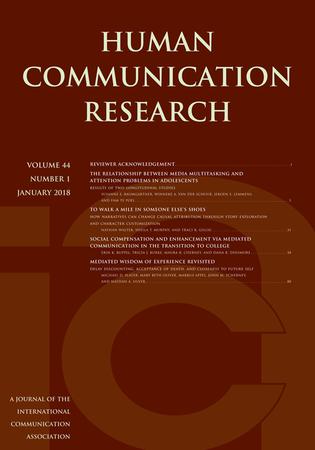Persuasive message effects via activated and modified belief clusters: toward a general theory
IF 4.4
1区 文学
Q1 COMMUNICATION
引用次数: 0
Abstract
Abstract This article proposes a general theory of persuasive message effects based on four sets of arguments. The first set commits to theorizing that focuses on specifying causal order and the explanatory principle driving that order. The second set makes the case that specifying a complex causal order among a series of cognitions is unjustifiable in many cases. The third set contends that many cognitions in the persuasion process can be conceptually treated as distinct beliefs within a network. The fourth and final set theorizes that persuasive message effects occur via the activation and modification of belief clusters. This article works through these arguments in detail and then provides examples of how this framework could be implemented to guide theorizing about persuasive message effects.通过激活和修改信念簇的说服信息效应:走向一般理论
摘要本文在四套论证的基础上,提出了说服性信息效应的一般理论。第一组致力于理论化,重点是指定因果顺序和驱动该顺序的解释原则。第二种观点认为,在许多情况下,在一系列认知中指定复杂的因果顺序是不合理的。第三种观点认为,说服过程中的许多认知在概念上可以被视为一个网络中的不同信念。第四组也是最后一组理论认为,有说服力的信息效应是通过激活和修改信念集群而发生的。本文对这些论点进行了详细的研究,然后提供了如何实施这个框架的例子,以指导关于说服性信息效应的理论化。
本文章由计算机程序翻译,如有差异,请以英文原文为准。
求助全文
约1分钟内获得全文
求助全文
来源期刊

Human Communication Research
COMMUNICATION-
CiteScore
8.20
自引率
2.00%
发文量
28
期刊介绍:
Human Communication Research is one of the official journals of the prestigious International Communication Association and concentrates on presenting the best empirical work in the area of human communication. It is a top-ranked communication studies journal and one of the top ten journals in the field of human communication. Major topic areas for the journal include language and social interaction, nonverbal communication, interpersonal communication, organizational communication and new technologies, mass communication, health communication, intercultural communication, and developmental issues in communication.
 求助内容:
求助内容: 应助结果提醒方式:
应助结果提醒方式:


